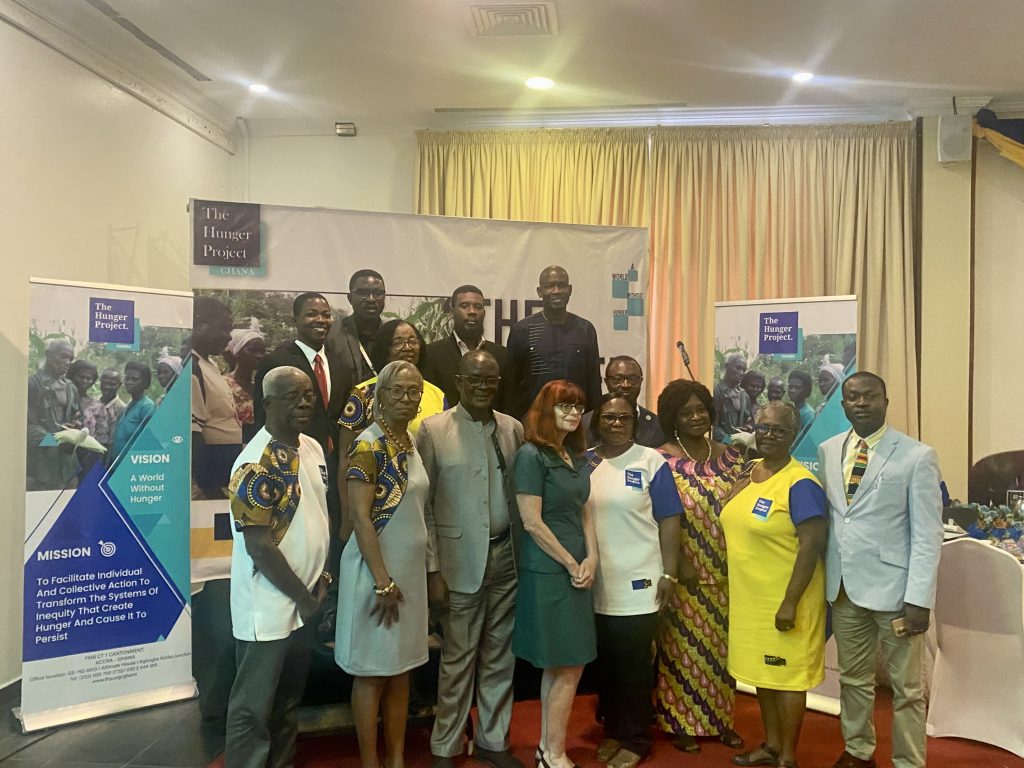By Eric Appah Marfo
Accra, July 27, GNA — Mr Samuel Afrane, the Country Director of The Hunger Project-Ghana (THP-Ghana), has urged developing countries to strive towards attaining food sovereignty by building food systems to feed their populations.
He said each country’s ability to achieve food sovereignty would promote greater food security globally.
Mr Afrane said this on Thursday during the launch of THP-Ghana’s new Vision and Mission in Accra.
He said from 2005 to 2018, the number of undernourished people dropped by more than 200 million while the population continued to rise.
Mr Afrane said the situation of hunger continued to worsen because of climate change, conflict, global inequality and the COVID-19 pandemic.
“We are now at higher numbers than we were in 2005, with 828 million people undernourished. We are facing the stark reality that, after decades of progress in reducing hunger, the trend has reversed,” he said.
Mr Afrane said the changing climate in the world was threatening the usual ways of doing agriculture and reducing the ability to feed the increasing populations in Tropical Africa.
“Climate change is a brutal reality for farmers and fishers in Africa. There is, therefore, greater need for investment in climate adaptation. At the same time, we know we must transform the world’s food systems to achieve the UN Sustainable Development Goals and reach the climate targets contained in the Paris Agreement,” he said.
He said from the latter part of 2000 until now, THP had pursued the Epicenter Strategy, which supported the creation of sustainable rural communities that worked towards ending hunger and poverty.
“In Ghana, we have 45 Epicenters across 33 Districts in five Regions pursuing an integrated social and economic development together. In the Eastern Region alone, THP constructed 38 CHPS Compounds, which is about half the stock of operational Rural Clinics in the region,” he said.
Mr Afrane said THP’s activities had directly benefitted over 350,000 Ghanaians living in 542 rural communities and had trained over 2,500 volunteers to lead communities in the development of agriculture, health and nutrition, education, women empowerment, microfinance and livelihoods development, and engagement with Local Government.
Mr Afrane said THP- Ghana’s new Vision to create “A world without hunger” and new Mission to “facilitate individual and collective action to transform the systems of inequity that create hunger and cause it to persist”, would create a future that belonged to everyone.
“It is a future where hunger is neither created nor tolerated. A future of peace, where humanity lives in harmony with our natural environment, and where each human being is recognised, valued, included and belongs.
“The launch of these statements provides a new lens and an opportunity for us in The Hunger Project to evolve our ways of working, with new programmes, new areas of thought leadership,
and new opportunities for active participation. And, of course, we will co-create all of that in collaboration with our community partners and our investors. This is only the beginning!”

Mr Tim Prewit, Global Chief Executive Officer, THP, through a video message, expressed joy at the creation of the Epicentres, which were creating change in the lives of the local people and other communities.
He lauded Ghana for its contributions towards eradicating hunger, adding that, the nation had an important role to play in creating a world without hunger.
Professor Esther Sakyi-Dawson, Chairman of the National Advisory Council, THP-Ghana, called for more concerted efforts to realise the new vision and mission, adding that, THP-Ghana would maintain existing partnerships to tackle hunger, especially amongst women, children and the youth.
She advised them to be gender focused by harnessing the full potential of every community member, with greater focus on youth leadership.

The event was graced by representatives from the Ministry of Health, Ministry of Food and Agriculture, the Church of Jesus Christ of Latter Day Saint, the Council for Scientific and Industrial Research (CSIR), community partners, among others, who shared solidarity messages to congratulate and reaffirm their commitment to THP-Ghana’s new vision and mission.
GNA